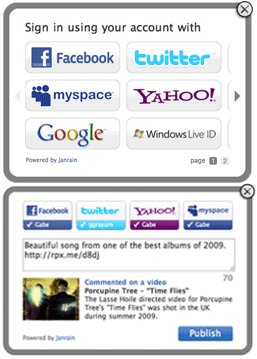 Support for Drupal 7 is ending on 5 January 2025—it’s time to migrate to Drupal 10! Learn about the many benefits of Drupal 10 and find migration tools in our resource center.
Support for Drupal 7 is ending on 5 January 2025—it’s time to migrate to Drupal 10! Learn about the many benefits of Drupal 10 and find migration tools in our resource center.Looking for Drupal 8 support?
See the Drupal Connector for Janrain Identity Cloud from CI&T at https://www.drupal.org/project/janrain_connect.
The Janrain Social Login module integrates Drupal sites with the Janrain Social Login service.
Using Janrain Social Login, Drupal sites can authenticate new and existing users with popular social networks, map user profile data from these websites to Drupal fields, and share Drupal content with a user's friends on their social networks.
The module helps Drupal websites quickly and seamlessly integrate with 30+ social networks includingFacebook, Twitter, Google, Yahoo!, LinkedIn, AOL, PayPal, and Microsoft Account.
Instead of having to integrate with each of these sites on your own (and manage API changes over time), Janrain Engage does the heavy lifting for you. Using this module, you can get setup in under 10 minutes. The result is an accelerated user registration process, an enhanced ability to gather user data, and increased site traffic from the viral promotion of your content.
Pre-Requisites
A configured Janrain Social Login account is required to use this module. If you don't yet have a Janrain Social Login API Key, please visit the following link to create a Janrain Social Login account: http://janrain.com/product/social-login/plans/basic/
Module dependencies
Module features
- LOGIN AND REGISTRATION: Allow site visitors to register and login with one of their existing accounts at popular social networks such as Facebook, Google, Yahoo!, Twitter and LinkedIn. Support is included for both the Drupal user login block and the user login page. Quickly and easily converting anonymous site visitors into active registered users.
- DATA MAPPING: With permission of the user, you can map a user's social profile data to specific Drupal fields. A variety of fields are supported, including User fields, old-style core Profile fields (for those upgrading from Drupal 6), and Profile2 contributed module fields.
- IMPORT PROFILE PICTURE: Import profile photos from a user's social network account and use it as the Drupal profile picture.
- SOCIAL SHARING: Make it easy for users to share their Drupal content and comments with friends and followers on other social networks. A "Share" button or link may be included on specific content types, which triggers the Janrain Engage social sharing widget. When a user submits a comment, this widget can be automatically triggered (suggesting to the user that he/she should share the comment).
- LINKED ACCOUNT MANAGEMENT: A "Linked accounts" tab is provided to the end user (who has the appropriate module permission). Using this tab, a user can add, remove, or otherwise manage the social network accounts connected to his/her Drupal site account.
- RULES INTEGRATION: For those using the popular Rules module, you can configure the full range of Rules-based actions to occur (change a role, send an e-mail, etc.) whenever a user adds or removes a linked account via Janrain Engage. You can also configure the Janrain Engage social sharing widget to launch on various Rule-based events.
- VIEWS INTEGRATION: If you use the Views module, you can easily create various views that include such data as linked account ID's, provider information and icon, as well as a link to delete the account. These can be used, for example, to create site-wide analytics about the number of linked accounts of a given type that have been created.
- CAPTCHA INTEGRATION: Now you can use any of the popular captcha modules (Mollom, Captcha and its submodules) alongside Janrain Engage. While regular sign-ups will still be required to go through captcha verification, sign-ups via Janrain Social Login (Engage) will be automatic.
All of these features have been implemented in a modular fashion so that you only need to enable the specific features that you need.
Supported Social Networks and Identity Providers
The full list of social networks supported by Janrain Social Login is available at https://rpxnow.com/docs/providers
Quick Installation and Configuration Guide
For Drupal 7:
- Download, install, and enable the Janrain Social Login module
- Download, install, and enable the Rules and Entity modules.
- Enter your Janrain Social Login client secret (found in the Janrain dashboard: https://rpxnow.com/relying_parties//settings) in the API Key field in Configuration > Janrain Engage > Setup
- Validate your identity provider setup in Configuration > Janrain Engage > Identity Providers
- If you want users to create their own accounts using Janrain Engage, visit Configuration > People > Accounts and select "Visitors" under "Who can register accounts?"
- Configure your desired authentication parameters from Administration > Configuration > Janrain Engage > Authentication
- (Optional) Configure Janrain Social Sharing v2 in Administration > Configuration > Janrain Engage > Social Sharing
- (Optional) Configure verification e-mail parameters in Administration > Configuration > Janrain Engage > Social Sharing
- (Optional) Configure mapping of Janrain customer profile attributes to Drupal fields in Administration > Configuration > Janrain Engage
* NOTE: If you don't yet have a Janrain Social Login API Key, please visit the following link to create a Janrain Social Login account: http://janrain.com/product/social-login/plans/basic/
Dependencies
You must enable the OpenSSL extension for PHP. Most servers will have this extension enabled by default.
Development and Bug Reports
We welcome your comments, suggestions, bug reports, patches, and feature requests.
Please submit your feedback is in the module's issue queue.
Project information
- Module categories: Integrations, Access Control
85 sites report using this module
- Created by nrambeck on , updated
Stable releases for this project are covered by the security advisory policy.
Look for the shield icon below.
Releases
Development version: 7.x-2.x-dev updated 15 Apr 2016 at 19:14 UTC














